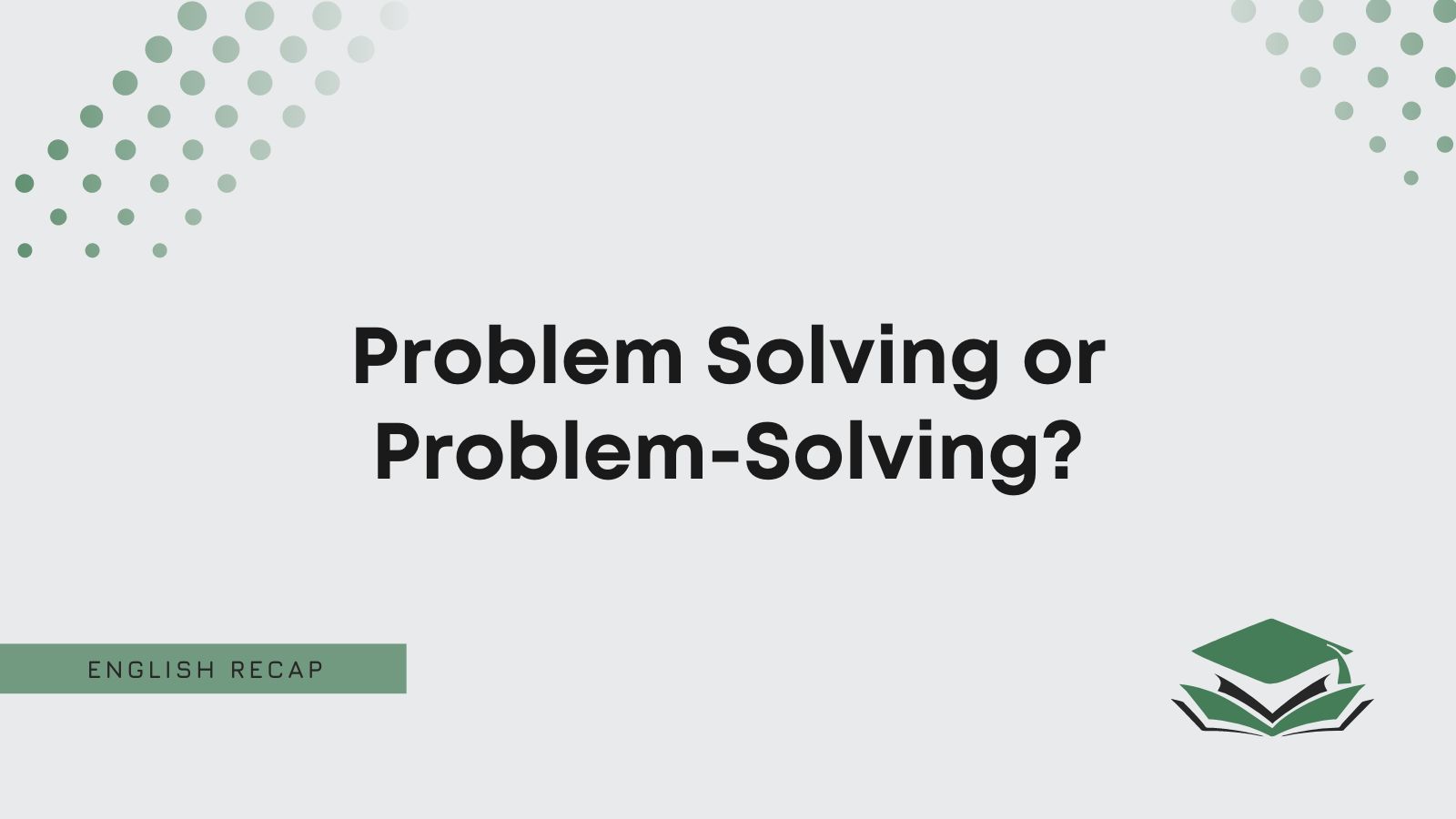The term problem-solving with a hyphen is an adjective that describes nouns in a sentence. E.g., “The problem-solving abilities of this program are excellent.” Furthermore, the term problem solving without a hyphen is a noun. E.g., “He is excellent at problem solving.”
The term problem solving can appear as two different word types, a noun or a compound adjective.
When problem-solving has a hyphen, it is an adjective describing a noun.
For example, in this sentence, problem-solving describes capabilities, which is a noun. Therefore, you need to include a hyphen.
- Her problem-solving capabilities are outstanding.
However, when you use problem solving as a noun, the term is usually not hyphenated because it doesn’t modify anything.
- She is an expert at all types of problem solving.
Furthermore, the rule of using a hyphen for the adjective but not for the noun is correct grammar according to AP Style and the Chicago Manual of Style.
Sometimes in English, the rules concerning punctuation, such as hyphens, are vague. For example, in the Cambridge and Oxford dictionaries, the noun problem-solving appears with a hyphen.
Essentially, you should always use a hyphen for the term problem-solving as an adjective. However, for problem solving as a noun, unless you follow a specific style guide like AP that does not use a hyphen, you can choose whether to hyphenate the noun. Just make sure that you are consistent with your choice.
In addition, Google Ngram shows that problem solving without a hyphen is slightly more popular in the US than with a hyphen. However, in the UK, the hyphenated version is slightly more frequent.
Now that you have learned the basics concerning the term problem solving, please keep reading the rest of the article to learn more about using the two variations of problem solving.
Problem Solving
The term problem solving as two words without a hyphen is the noun form.
In terms of use, it relates to resolving problems, which can relate to problems in a specific discipline or more general problems.
In the following examples, the term problem solving refers to the act of solving problems. Therefore, we do not need a hyphen.
- Her inability to perform problem solving on any task means that she loses her temper quickly.
- You should include problem solving as a skill on your resume.
- In team projects, effective problem solving can lead to innovative solutions and successful outcomes.
- Problem solving is not just about finding immediate answers but understanding the root cause of the issue.
- Her approach to problem solving often involves breaking down complex tasks into manageable steps.
Furthermore, you should use the above rule when following both AP Style or the Chicago Manual of Style.
Problem-Solving
The term problem-solving as one word with a hyphen is a compound word that appears before a noun. Hence, it modifies the noun.
For example, in the following sentence, the word problem-solving modifies the noun skills.
- His problem-solving skills are the best in the company.
- Her problem-solving approach is both methodical and creative, making her a valuable asset to the team.
- The workshop focuses on problem-solving techniques to address everyday challenges.
- Many employers prioritize candidates with strong problem-solving abilities in dynamic work environments.
- The game challenges children to use their problem-solving instincts to navigate various puzzles.
Furthermore, you will come across some sentences in which the noun problem solving has a hyphen.
As shown in these examples:
- You need to work on your problem-solving if you want to become an engineer.
- Improving your problem-solving is essential for success in mathematics.
- Mastering problem-solving will greatly benefit you in software development.
This is often a stylistic choice. However, in writing that follows AP Style, you should not use a hyphen with the noun form of problem solving.
Problemsolving
The word problemsolving as a single word with no hyphen or space is incorrect, and you shouldn’t use it in this format.
There are two ways you can use the term problem solving.
The first is as a noun, in which case there is no hyphen, but there is a space.
- Correct: He is excellent at problem solving because he never gives up. (noun)
- Incorrect: He is excellent at problemsolving because he never gives up. (noun)
- Correct: She has a knack for problem solving, especially in high-pressure situations. (noun)
- Incorrect: She has a knack for problemsolving, especially in high-pressure situations. (noun)
Also, you can write problem-solving as an adjective, in which case you need a hyphen.
- Correct: He is excellent at problem solving because he never gives up. (adjective)
- Incorrect: He is excellent at problemsolving because he never gives up. (adjective)
- Correct: They often turn to her for advice on problem solving in challenging situations. (adjective)
- Incorrect: They often turn to her for advice on problemsolving in challenging situations. (adjective)
That’s all you need to know about the grammar rules concerning the words problem solving, problem-solving, and problemsolving. Rest assured that your sentences will be correct if you follow these!

